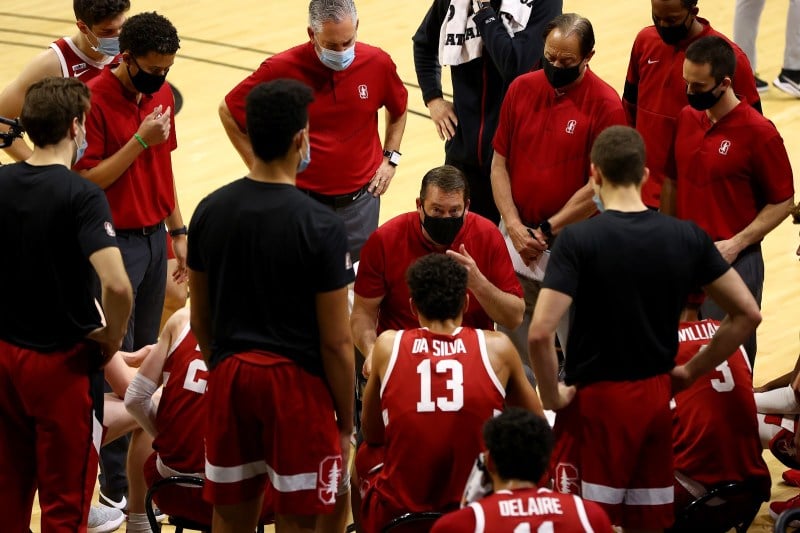The Stanford Athletic Department is requiring student-athletes and staff within Stanford’s men’s and women’s basketball programs to wear small devices that track distance and duration between users throughout most of the day to comply with Pac-12 program requirements.
The department has been tight-lipped about whether student-athletes were consulted in the decision-making process — and students were not allowed to opt out of the program without sacrificing being able to play for their team.
The devices, which do not track location, are used specifically for contact-tracing purposes to identify if anyone came in contact with someone who tested positive for COVID-19, according to Stanford Athletics spokesperson Brian Risso.
Stanford basketball’s implementation of the wearables is part of a Pac-12 program that provides KINEXON SafeTags— small devices that can be worn on any part of the body — to member universities. The initiative was announced on Nov. 30 and was initially intended for football and basketball programs. Though all schools in the conference are required to participate, Stanford was unable to implement the SafeTags for the football program prior to the team’s relocation to Seattle. According to Risso, the onboarding process for the basketball programs began shortly after Christmas.
Student-athletes, coaches and staff must use the SafeTags in competition, as well as in situations that are considered high-risk, such as bus rides and team meals. The data that the University collects is used only when an individual tests positive for COVID-19 in order to see who they came in contact with, Risso said.
According to Pac-12 spokesperson Jesse Hooker, the data has helped the conference decide when to cancel or postpone games. “More importantly, however, it has helped Athletics Departments identify and quarantine potential high risk contacts and keep their student-athletes and staffs safe,” Hooker wrote in a statement to The Daily.
The use of tracking technology by universities across the country has drawn scrutiny. Tracking has become more prevalent during the pandemic, allowing institutions to use data to limit community spread. For example, Harvard has used Bluetooth capabilities to detect which members of the school community came in contact with others who tested positive. In an effort to protect the privacy of users, the KINEXON SafeZone technology used in the program does not track location or movement, but instead records the distance and duration between users.
It’s a tug-of-war between safety and privacy, said political science professor Jeremy Weinstein, who teaches a course on ethics, public policy and technological change.
“This is part of a broader conversation that Stanford and our society is engaged in around how to balance the individual right to privacy with some collective goals that we have at the current moment,” Weinstein said. “The goal that is perhaps most prominently on display here is the safety of our community in terms of its public health. But there’s also a goal that the Pac-12 and the University have, which is to maintain a sports season.”
In the deliberations leading up to the conference’s decision to use KINEXION technology, medical teams from each Pac-12 university were represented in the Pac-12 COVID Medical Advisory Committee, Hooker wrote.
But in Weinstein’s view, decisions like these also “demand engagement with key individuals who are likely to be affected by the University’s choices. That means student-athletes and coaches and professional staff.”
In reaching the decision, it is unclear to what extent, if any, the athletics department consulted those who are directly affected by the measures. Though The Daily reached out to the athletics department to interview a staff member or student-athlete in the basketball program, the department declined.
The department also declined to comment on whether student-athletes were consulted.
Risso explained that during the onboarding process, the University communicated to all participating individuals that the data collected is intended to ensure that the University is “precise with our high-risk exposure identification and quarantining procedures.” He added that student-athletes were assured that the data collected would be kept on secure servers.
However, according to Swegan, student-athletes were not given the option to remain on the team for the 2020-21 season if they did not want to participate in the SafeTag program. If student-athletes chose to opt out of the program, and, consequently, the season, they would have been able to do so without penalty or loss of scholarship, Swegan wrote. He did not specify how much time student-athletes were given to make a decision before Stanford began implementing the program.
While contact tracing is central to preventing community spread, Weinstein said, consistent communication between all parties involved is crucial to ensure that the program serves the goals of contact tracing alongside protecting the privacy of individuals.
“The University is trying to figure out how to [implement the program] safely,” Weinstein said. “But it’s only out of a deliberation, out of a dialogue, that you’re going to be able to figure out if you are striking a balance that’s comfortable for your relevant constituents.”
Though the University will continue using the KINEXON technology for the remainder of the men’s and women’s basketball seasons, it does not currently plan to expand to other programs, Risso said.
Contact the news section at news ‘at’ stanforddaily.com.
This article and its headline have been corrected to reflect that KINEXON SafeTags do not track location or movement, but rather record the distance and duration between users for contact-tracing purposes. The Daily regrets this error.
